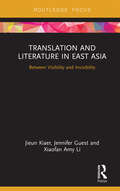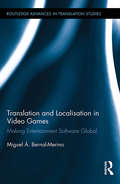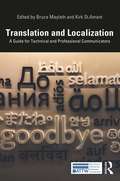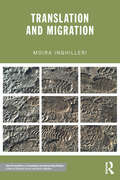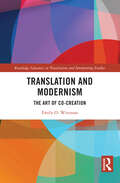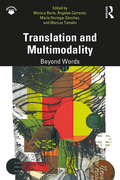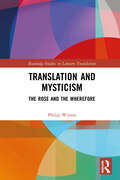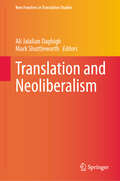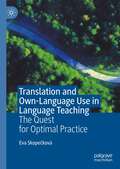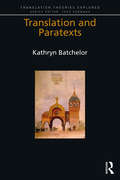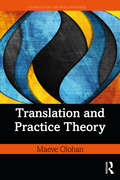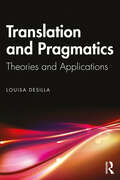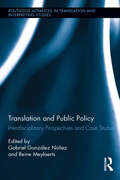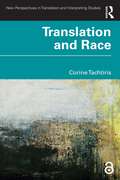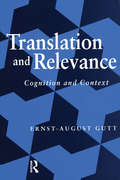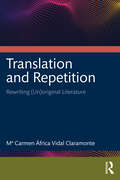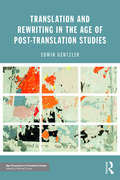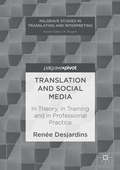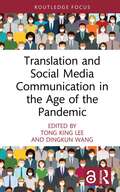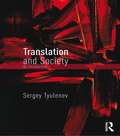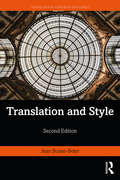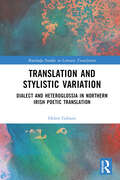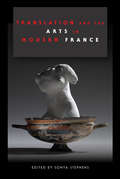- Table View
- List View
Translation and Literature in East Asia: Between Visibility and Invisibility (Routledge Studies In East Asian Translation Ser.)
by Jieun Kiaer Jennifer Guest Xiaofan Amy LiTranslation and Literature in East Asia: Between Visibility and Invisibility explores the issues involved in translation between Chinese, Japanese and Korean, as well as from these languages into European languages, with an eye to comparing the cultures of translation within East Asia and tracking some of their complex interrelationships. This book reasserts the need for a paradigm shift in translation theory that looks beyond European languages and furthers existing work in this field by encompassing a wider range of literature and scholarship in East Asia. Translation and Literature in East Asia brings together material dedicated to the theory and practice of translation between and from East Asian languages for the first time.
Translation and Localisation in Video Games: Making Entertainment Software Global (Routledge Advances in Translation and Interpreting Studies)
by Miguel Bernal-MerinoThis book is a multidisciplinary study of the translation and localisation of video games. It offers a descriptive analysis of the industry – understood as a global phenomenon in entertainment – and aims to explain the norms governing present industry practices, as well as game localisation processes. Additionally, it discusses particular translation issues that are unique to the multichannel nature of video games, in which verbal and nonverbal signs must be cohesively combined with interactivity to achieve maximum playability and immerse players in the game’s virtual world. Although positioned within the theoretical framework of descriptive translation studies, Bernal-Merino incorporates research from audiovisual translation, software localisation, computer assisted translation, comparative literature, and video game production. Moving beyond this framework, Translation and Localisation in Video Games challenges some of the basic tenets of translation studies and proposes changes to established and unsatisfactory processes in the video game and language services industries.
Translation and Localization: A Guide for Technical and Professional Communicators (ATTW Series in Technical and Professional Communication)
by Bruce Maylath Kirk St. AmantDetailed yet accessible, Translation and Localization brings together the research and insights of veteran practicing translators to offer comprehensive guidance for technical communicators. The volume begins with the fundamentals of translation before leading readers through the process of preparing technical documents for translation. It then presents the broader area of localization, again beginning with its key competencies. Concluding chapters examine the state of the field as computers take on more translation and localization work. Featuring real-life scenarios and a broad range of experienced voices, this is an invaluable resource for technical and professional communicators looking to expand into international markets. This book will be of interest to students of ethnic conflict, Asian politics, and security studies.
Translation and Migration (New Perspectives in Translation and Interpreting Studies)
by Moira InghilleriTranslation and Migration examines the ways in which the presence or absence of translation in situations of migratory movement has currently and historically shaped social, cultural and economic relations between groups and individuals. Acts of cultural and linguistic translation are discussed through a rich variety of illustrative literary, ethnographic, visual and historical materials, also taking in issues of multiculturalism, assimilation, and hybridity analytically re-framed. This is key reading for students undertaking Translation Studies courses, and will also be of interest to researchers in sociology, cultural studies, anthropology and migration studies.
Translation and Modernism: The Art of Co-Creation (Routledge Advances in Translation and Interpreting Studies)
by Emily O. WittmanThis innovative volume extends existing conversations on translation and modernism with an eye toward bringing renewed attention to its ethically complex, appropriative nature and the subsequent ways in which modernist translators become co-creators of the materials they translate. Wittman builds on existing work at the intersection of the two fields to offer a more dynamic, nuanced, and wider lens on translation and modernism. The book draws on scholarship from descriptive translation studies, polysystems theory, and literary translation to explore modernist translators’ appropriation of source texts and their continuous recalibrations of equivalence between source text and translation. Chapters focus on translation projects from a range of writers, including Beckett, Garnett, Lawrence, Mansfield, and Rhys, with a particular spotlight on how women’s translations and women translators’ innovations were judged more critically than those of their male counterparts. Taken together, the volume puts forth a fresh perspective on translation and modernism and of the role of the modernist translator as co-creator in the translation process. This book will be of particular interest to scholars in translation studies, modernism, reception theory, and gender studies.
Translation and Multimodality: Beyond Words
by Ángeles Carreres Marcus Tomalin Monica Boria Maria Noriega-SánchezTranslation and Multimodality: Beyond Words is one of the first books to explore how translation needs to be redefined and reconfigured in contexts where multiple modes of communication, such as writing, images, gesture, and music, occur simultaneously. Bringing together world-leading experts in translation theory and multimodality, each chapter explores important interconnections among these related, yet distinct, disciplines. As communication becomes ever more multimodal, the need to consider translation in multimodal contexts is increasingly vital. The various forms of meaning-making that have become prominent in the twenty-first century are already destabilising certain time-honoured translation-theoretic paradigms, causing old definitions and assumptions to appear inadequate. This ground-breaking volume explores these important issues in relation to multimodal translation with examples from literature, dance, music, TV, film, and the visual arts. Encouraging a greater convergence between these two significant disciplines, this text is essential for advanced students and researchers in Translation Studies, Linguistics, and Communication Studies.
Translation and Mysticism: The Rose and the Wherefore (Routledge Studies in Literary Translation)
by Philip WilsonThis book examines how mysticism can tell us about translation and translation can tell us about mysticism, addressing the ancient but ongoing connections between the art of rendering one text in another language and the art of the ineffable.The volume represents the first sustained act of attention to the interdisciplinary crossover of these two fields, taking a Wittgensteinian approach to language, and investigates how mystics and their translators manage to write about what cannot be written about. Three questions are addressed overall: how mysticism can be used to conceptualise translation; the issues that mysticism raises for translation theory and practice; and how mystical texts have been and might be translated. Walter Benjamin’s ‘The Translator’s Task’ is considered in detail as a controversial example of dialogue. Translation examples are given in a range of languages, and six major case studies are provided, including a close reading of Exodus and an analysis of a recent radical translation of Lucretius. This book will be of interest to students and researchers in translation studies, mysticism studies, theology and literary translation, as well as practising translators.
Translation and Neoliberalism (New Frontiers in Translation Studies)
by Ali Jalalian Daghigh Mark ShuttleworthThis book explores the intersections of neoliberalism, translation, and interpreting, a scarcely explored topic in the field of translation studies across diverse regions, including Europe, North America, Asia, and Australia, covering four primary themes that offer unique perspectives on how neoliberal ideologies influence translation and interpreting. The first theme uses data triangulation to delve into the influence of market-driven ideologies on translation and interpreting curriculum globally as well as the neoliberal tendencies of the trainees in China and Korea. The second theme investigates the effects of top-down neoliberal policies on translation services and practices in Australia, Canada, and the UAE, examining how these policies influence service quality, working conditions, and the balance between market demands and academic requirements. The third theme assesses the influence of technology and neoliberalism on the translation and interpreting labor market, providing a critical analysis of the automation of translation workflows, the rise of non-standard employment arrangements, and the socio-economic challenges faced by translation professionals. The final theme analyzes the intersection of neoliberalism and translation at the discourse level, employing various approaches including critical discourse analysis and content analysis to explore how neoliberal values manifest in translated texts and practices in China, Iran, and USA. This book is an essential resource for academics, postgraduate students, researchers, policymakers, educators, and practitioners interested in the dynamic interplay between neoliberalism and translation, offering new insights and critical perspectives that contribute to a deeper understanding of the socio-economic forces shaping the field of translation and interpreting.
Translation and Own-Language Use in Language Teaching: The Quest for Optimal Practice
by Eva SkopečkováThis book reconsiders the role of translation and own-language use in the EFL (English as a Foreign Language) classroom. It shows prospective teachers how to use the learners’ own language and translation optimally. The author surveys current research about the EFL classroom and presents both a theoretical framework and a didactic model for using translation and learners’ mother tongues. This is done through an action research project, assessing the proposed didactic model for optimal translation practice in English Language teaching (OTP in ELT) through its integration into teacher education. The book will be of interest to students and researchers in the areas of Translation Studies and Applied Linguistics (particularly EFL, ESL, TEFL and TESOL), as well as educators and designers of pre-service training programmes for language teachers.
Translation and Paratexts (Translation Theories Explored)
by Kathryn BatchelorAs the 'thresholds' through which readers and viewers access texts, paratexts have already sparked important scholarship in literary theory, digital studies and media studies. Translation and Paratexts explores the relevance of paratexts for translation studies and provides a framework for further research. Writing in three parts, Kathryn Batchelor first offers a critical overview of recent scholarship, and in the second part introduces three original case studies to demonstrate the importance of paratextual theory. Batchelor interrogates English versions of Nietzsche, Chinese editions of Western translation theory, and examples of subtitled drama in the UK, before concluding with a final part outlining a theory of paratextuality for translation research, addressing questions of terminology and methodology. Translation and Paratexts is essential reading for students and researchers in translation studies, interpreting studies and literary translation.
Translation and Practice Theory (Translation Theories Explored)
by Maeve OlohanTranslation and Practice Theory is a timely and theoretically innovative study linking professional practice and translation theory, showing the usefulness of a practice-theoretical approach in addressing some of the challenges that the professional world of translation is currently facing, including, for example, the increasing deployment of machine translation. Focusing on the key aspects of translation practices, Olohan provides the reader with an in-depth understanding of how those practices are performed, as translators interact with people, technologies and other material resources in the translation workplace. The practice-theoretical perspective helps to describe and explain the socio-material complexities of present-day commercial translation practice but also offers a productive approach for studies of translation and interpreting practices in other settings and periods. This first book-length exploration of translation through the lens of practice theory is key reading for advanced students and researchers of Translation Theory. It will also be of interest in the area of professional communication within Communication Studies and Applied Linguistics.
Translation and Pragmatics: Theories and Applications
by Louisa DesillaTranslation and Pragmatics aims to provide a fundamental grounding of key phenomena, theories, and concepts in the field of pragmatics and of some of their manifestations both within and across languages and cultures. The originality of this textbook largely resides in its pedagogical approach which involves familiarising students with the pragmatic phenomena of deixis, speech acts, implicature, and (im)politeness first and foremost through a systematic exposure to concrete, authentic data from a broad spectrum of texts and media (e.g., ads, memes, films, videogames) while showcasing how these phenomena are relayed in different types of translation. With warm-up exercises, illustrative case studies, mini-research activities as well as further reading, this is an essential textbook for translation and intercultural communication students but can also be a useful resource for anyone interested in the interface between pragmatics, translation and/or intercultural communication, media, and the synergies thereof.
Translation and Public Policy: Interdisciplinary Perspectives and Case Studies (Routledge Advances in Translation and Interpreting Studies)
by Gabriel González Núñez Reine MeylaertsThis book brings together an ensemble of leading voices from the fields of economics, language policy, law, political philosophy, and translation studies. They come together to provide theoretical perspectives and practical case studies regarding a shared concern: translation policy. Their timely perspectives and case studies allow for the problematizing and exploration of translation policy, an area that is beginning to come to the attention of scholars. This book offers the first truly interdisciplinary approach to an area of study that is still in its infancy. It thus makes a timely and necessary contribution. As the 21st century marches on, authorities are more and more confronted with the reality of multilingual societies, and the monolingual state polices of yesteryear seem unable to satisfy increasing demands for more just societies. Precisely because of that, language policies of necessity must include choices about the use or non-use of translation at different levels. Thus, translation policy plays a prominent yet often unseen role in multilingual societies. This role is shaped by tensions and compromises that bear on the distribution of resources, choices about language, legal imperatives, and notions of justice. This book aims to inform scholars and policy makers alike regarding these issues.
Translation and Race (New Perspectives in Translation and Interpreting Studies)
by Corine TachtirisTranslation and Race brings together translation studies with critical race studies for a long-overdue reckoning with race and racism in translation theory and practice. This book explores the "unbearable whiteness of translation" in the West that excludes scholars and translators of color from the field and also upholds racial inequities more broadly. Outlining relevant concepts from critical race studies, Translation and Race demonstrates how norms of translation theory and practice in the West actually derive from ideas rooted in white supremacy and other forms of racism. Chapters explore translation’s role in historical processes of racialization, racial capitalism and intellectual property, identity politics and Black translation praxis, the globalization of critical race studies, and ethical strategies for translating racist discourse. Beyond attempts to diversify the field of translation studies and the literary translation profession, this book ultimately calls for a radical transformation of translation theory and practice. This book is crucial reading for advanced students and scholars in translation studies, critical race and ethnic studies, and related areas, as well as for practicing translators.
Translation and Race (New Perspectives in Translation and Interpreting Studies)
by Corine TachtirisTranslation and Race brings together translation studies with critical race studies for a long-overdue reckoning with race and racism in translation theory and practice. This book explores the "unbearable whiteness of translation" in the West that excludes scholars and translators of color from the field and also upholds racial inequities more broadly.Outlining relevant concepts from critical race studies, Translation and Race demonstrates how norms of translation theory and practice in the West actually derive from ideas rooted in white supremacy and other forms of racism. Chapters explore translation’s role in historical processes of racialization, racial capitalism and intellectual property, identity politics and Black translation praxis, the globalization of critical race studies, and ethical strategies for translating racist discourse. Beyond attempts to diversify the field of translation studies and the literary translation profession, this book ultimately calls for a radical transformation of translation theory and practice.This book is crucial reading for advanced students and scholars in translation studies, critical race and ethnic studies, and related areas, as well as for practicing translators.
Translation and Relevance: Cognition and Context
by Ernst-August GuttFrom the outset, this book has evoked strong responses. Its central claim is that given a comprehensive theory of inferential communication, there is no need for a special theory of translation. This has been praised by some as "wise and right" (Dell Hymes) and condemned by others as "astonishing, not to say perverse" (Kirsten Malmkjaer). Gutt's call to move from semiotics to an inferential paradigm of communication remains a challenge for many. The debate continues and so does the demand for the book, resulting in this second edition. There is a 'Postscript' entitled 'A decade later', where the author addresses peer criticism, especially from those involved in the movement of 'translation studies', and attempts to bring out more clearly the unique mandate of translation. New perspectives, such as authenticity, are also introduced. Marginal notes, some tongue-in-cheek, liven up the discussion and new references ensure its currency.
Translation and Repetition: Rewriting (Un)original Literature
by Mª Carmen Vidal ClaramonteTranslation and Repetition: Rewriting (Un)original Literature offers a new and original perspective in translation studies by considering creative repetition from the perspective of the translator. This is done by analyzing so-called "unoriginal literature" and thus expanding the definition of translation. In Western thought, repetition has long been regarded as something negative, as a kind of cliché, stereotype or automatism that is the opposite of creation. On the other hand, in the eyes of many contemporary philosophers from Wittgenstein and Derrida to Deleuze and Guattari, repetition is more about difference. It involves rewriting stories initially told in other contexts so that they acquire a different perspective. In this sense, repeating is often a political act. Repetition is a creative impulse for the making of what is new. Repetition as iteration is understood in this book as an action that recognizes the creative and critical potential of copying. The author analyzes how our time understands originality and authorship differently from past eras, and how the new philosophical ways of approaching repetition imply a new way of understanding the concept of originality and authorship. Deconstruction of these notions also implies subverting the traditional ways of approaching translation. This is vital reading for all courses on literary translation, comparative literature, and literature in translation within translation studies and literature.
Translation and Rewriting in the Age of Post-Translation Studies (New Perspectives in Translation and Interpreting Studies)
by Edwin GentzlerIn Translation and Rewriting in the Age of Post-Translation Studies, Edwin Gentzler argues that rewritings of literary works have taken translation to a new level: literary texts no longer simply originate, but rather circulate, moving internationally and intersemiotically into new media and forms. Drawing on traditional translations, post-translation rewritings and other forms of creative adaptation, he examines the different translational cultures from which literary works emerge, and the translational elements within them. In this revealing study, four concise chapters give detailed analyses of the following classic works and their rewritings: A Midsummer Night’s Dream in Germany Postcolonial Faust Proust for Everyday Readers Hamlet in China. With examples from a variety of genres including music, film, ballet, comics, and video games, this book will be of special interest for all students and scholars of translation studies and contemporary literature.
Translation and Social Media
by Renée DesjardinsThis book offers a timely discussion of translation and social media through the lens of three overarching themes that structure the book: theory, training, and professional practice. The author includes references that cite recent translation and social media industry data, while also drawing on contemporary interdisciplinary research to make the content relevant for a wide-ranging audience: students, professionals and researchers alike. Desjardins provides an analysis of some of the new challenges and questions social media pose for translation, which include, but are not limited to, the translation of hashtags and the relevance of indexing, social media literacy and competency in translator training, translator visibility and remuneration in the 'like' economy, tactile modalities in social media branding, and social media monitoring and content translation. Examples from a variety of online social media platforms are provided, including Facebook, Twitter, LinkedIn and Instagram. While written primarily from a Translation Studies' perspective, readers with expertise in Social Media Studies and Communication are also likely to find the content engaging, particularly those interested in intercultural communications and brand management.
Translation and Social Media Communication in the Age of the Pandemic (Routledge Focus on Translation and Interpreting Studies)
by Tong King LeeThis collection of essays represents the first of its kind in exploring the conjunction of translation and social media communication, with a focus on how these practices intersect and transform each other against the backdrop of the cascading COVID-19 crisis. The contributions in the book offer empirical case studies as well as personal reflections on the topic, illuminating a broad range of themes such as knowledge translation, crisis communications, language policies, cyberpolitics and digital platformization. Together they demonstrate the vital role of translation in the trust-based construction of global public health discourses, while accounting for the new medialities that are reshaping the conception, experience and critique of translation in response to the cultural, political and ecological challenges in the post-pandemic world. Written by leading scholars in translation studies, media studies and literary studies, this volume sets to open up new conversations among these fields in relation to the global pandemic and its aftermath.
Translation and Society: An Introduction (Routledge Advances In Translation And Interpreting Studies)
by Sergey TyulenevThis essential new textbook guides readers through the social aspects and sociologically informed approaches to the study of translation. Sergey Tyulenev surveys implicitly and explicitly sociological approaches to the study of translation, drawing on the most important and influential works both within translation studies and in sociology, as well as recent developments in the field. In addition to the theoretical grounding provided, the book explains in detail the methodology of studying translation from a sociological point of view. Translation and Society discusses why translation should be studied sociologically, reinforces the foundation of the sociologically informed translation research already in existence in the field and outlines possible new directions for the future. Throughout the book there are many examples and case studies and each chapter includes thought-provoking discussion points, possible assignments, and suggestions for further reading. This is an invaluable textbook for undergraduate and postgraduate students of Translation Studies.
Translation and Style (Translation Theories Explored)
by Jean Boase-BeierStyle plays a major role in the translation of literary as well as non-literary texts, and Translation and Style offers an updated survey of this highly interdisciplinary area of translation studies. Jean Boase-Beier examines a variety of disciplines and theoretical approaches including stylistics, literary criticism, and narratology to investigate how we translate style. This revised and expanded edition of the 2006 book Stylistic Approaches to Translation offers new and accessible explanations on recent developments in the field, notably in the areas of Relevance Theory and cognitive stylistics. With many authentic examples to show how style affects translation, this book is an invaluable resource for both students and scholars working in translation studies and comparative literature.
Translation and Stylistic Variation: Dialect and Heteroglossia in Northern Irish Poetic Translation (Routledge Studies in Literary Translation)
by Helen GibsonTranslation and Stylistic Variation: Dialect and Heteroglossia in Northern Irish Poetic Translation considers the ways in which translators use stylistic variation, analysing the works of three Northern Irish poet-translators to look at how, in this variety, the translation process becomes a creative act by which translators can explore their own linguistic and cultural heritage. The volume offers a holistic portrait of the use of linguistic variety – dialect and heteroglossia – in the literary translations of Seamus Heaney, Ciaran Carson, and Tom Paulin, shedding light on the translators’ choices but also readers’ experiences of them. Drawing on work from cognitive stylistics, Gibson reflects on how and why translators choose to add linguistic variety and how these choices can often be traced back to their socio-cultural context. The book not only extends existing scholarship on Irish-English literary translation to examine issues unique to Northern Ireland but also raises broader questions about translation in locations where language choice is fraught and political. The volume makes the case for giving increased consideration to the role of the individual translator, both for insights into personal choices and a more nuanced understanding of contemporary literary translation practices, in Ireland and beyond. This book will be of interest to scholars working in translation studies, literary studies and Irish studies.
Translation and the Arts in Modern France
by Sonya StephensTranslation and the Arts in Modern France sits at the intersection of transposition, translation, and ekphrasis, finding resonances in these areas across periods, places, and forms. Within these contributions, questions of colonization, subjugation, migration, and exile connect Benin to Brittany, and political philosophy to the sentimental novel and to film. Focusing on cultural production from 1830 to the present and privileging French culture, the contributors explore interactions with other cultures, countries, and continents, often explicitly equating intercultural permeability with representational exchange. In doing so, the book exposes the extent to which moving between media and codes—the very process of translation and transposition—is a defining aspect of creativity across time, space, and disciplines.
Translation and the Book Trade in Early Modern Europe
by José María Pérez Fernández Edward Wilson-Lee"This volume provides the first transnational overview of the relationship between translation and the book trade in early modern Europe. Following an introduction to the theories and practices of translation in early modern Europe, and to the role played by translated books in driving and defining the trade in printed books, each chapter focuses on a different aspect of translated-book history - language learning, audience, printing, marketing, and censorship - across several national traditions. This study touches on a wide range of early modern figures who played myriad roles in the book world; many of them also performed these roles in different countries and languages. Topics treated include printers' sensitivity to audience demand; paratextual and typographical techniques for manipulating perception of translated texts; theories of readership that travelled across borders; and the complex interactions between foreign-language teachers, teaching manuals, immigration, diplomacy, and exile"--
